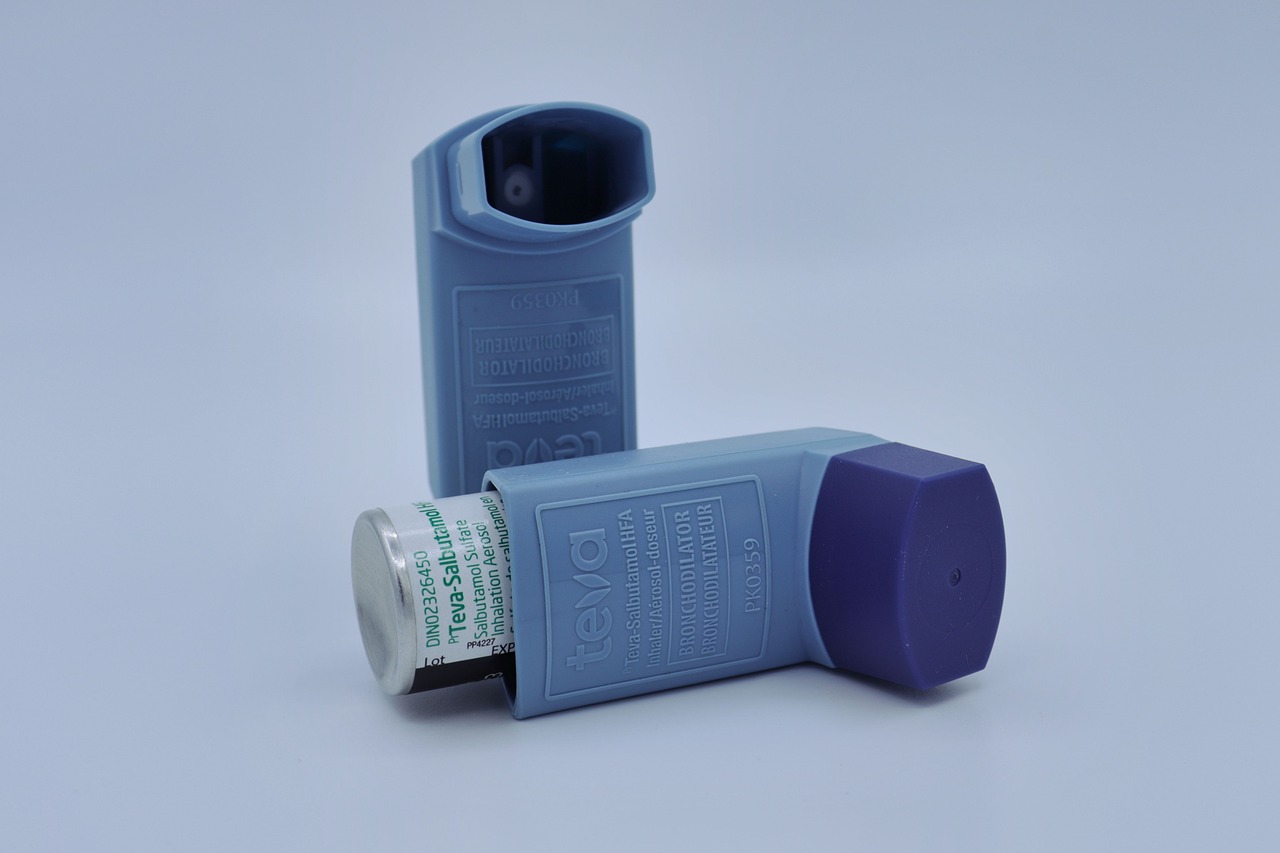We have all heard of asthma. You may have it yourself, know someone who does or just be aware of it as the most common respiratory condition in the UK. But how much do we really understand about it?
In this article, we will take a closer look at what asthma is, what causes it, common triggers and what it’s like to live with asthma.
What is asthma?
Asthma is a chronic condition that affects the lungs, making breathing difficult due to inflammation and narrowing of the airways. When the airways become swollen and irritated, they produce excess mucus and tighten, restricting airflow. This leads to symptoms such as:
- Wheezing
- Breathlessness
- Chest tightness
- Coughing
Asthma can vary in severity, with some individuals only experiencing occasional mild symptoms while others may have frequent and severe attacks. There is currently no cure for asthma, but symptoms can be effectively managed with the right treatment. Inhalers, which deliver medication directly to the airways, are the most common form of treatment, helping to reduce inflammation and open up the airways.
Causes of asthma
In the UK, 7.2 million people have asthma, which is around 10% of the population. This makes it the most common lung disease in the country. The exact cause of asthma is not fully understood, but research suggests that it is likely due to a combination of genetic and environmental factors. Certain individuals may be more prone to developing asthma based on the following risk factors:
- Genetics: Asthma often runs in families. If a close relative, such as a parent or sibling, has asthma, an individual is more likely to develop the condition.
- Environmental factors: Exposure to pollution, dust, smoke, and chemicals, especially at an early age, may increase the risk of developing asthma. Children who grow up in urban areas with high pollution levels or who are exposed to secondhand smoke are more susceptible.
Allergies: People with allergic conditions such as eczema or hay fever are more likely to have asthma.
Triggers of asthma
For many individuals with asthma, symptoms can be well managed with treatment, allowing them to go for extended periods without experiencing significant issues. However, certain triggers can cause flare-ups, leading to worsening symptoms or even asthma attacks. These triggers vary from person to person, but some of the most common include the following:
- Respiratory illnesses: Viral infections such as the flu, colds, or chest infections can worsen asthma symptoms by increasing airway inflammation and mucus production. This makes flu prevention especially important for people with asthma.
- Exercise: Physical activity can sometimes trigger asthma symptoms, particularly in cold or dry air. This is known as exercise-induced asthma.
- Weather changes: Sudden shifts in temperature, exposure to cold air, or high humidity can irritate the airways and trigger symptoms.
- Irritants: Common environmental triggers include smoke, strong perfumes, dust mites and mould.
What are asthma attacks?
One of the most serious aspects of asthma is the risk of an asthma attack. An asthma attack occurs when the muscles around the airways tighten, causing them to narrow even further. This makes it significantly harder to breathe and can lead to severe breathlessness, wheezing, coughing and a feeling of tightness in the chest.
Without prompt treatment, asthma attacks can become life-threatening, requiring emergency medical attention.
Asthma attacks are typically triggered by external factors that cause the airways to become inflamed and overly sensitive. Common triggers include:
- Allergies: Exposure to allergens such as dust, animal fur, and pollen can cause an immune response that worsens asthma symptoms.
- Exercise: Physical activity, particularly in cold or dry air, can lead to deep breathing that triggers coughing and breathlessness in some asthmatics.
- Smoke: Both cigarette smoke and smoke from fires or pollution can irritate the lungs and make asthma symptoms worse.
- Pollution: Airborne pollutants, such as car exhaust fumes and industrial emissions, can aggravate asthma by inflaming the airways.
- Cold air: Breathing in cold, dry air can cause the airways to constrict, making breathing more difficult.
- Infections: Viruses such as colds and the flu can inflame the airways and lead to a worsening of asthma symptoms, increasing the risk of an attack.
While these triggers may not always lead to a full asthma attack, they can cause symptoms to worsen temporarily. Understanding how different triggers affect asthma can help with managing the condition effectively.
Living with asthma
Asthma is a very manageable condition for most people. Asthmatics often carry a relief inhaler, commonly known as the “blue inhaler.” These inhalers provide fast-acting medication to open up the airways and make breathing easier when symptoms flare up.
Different types of inhalers
There are different types of inhalers. Some are used only when needed (relief inhalers), while others are taken daily to prevent symptoms (preventer inhalers). A doctor will prescribe the most suitable inhaler based on each individual’s condition.
However, asthma can change over time, which means the most effective treatment may also need to change. It’s important for asthmatics to visit their doctor at least once a year for a checkup. Keeping a record of when and where symptoms worsen can help your doctor provide the best advice and adjust treatment if necessary.
Habits for managing asthma
In addition to using inhalers correctly, asthmatics can take other steps to stay healthy and reduce the risk of flare-ups. These include:
Not smoking
Smoking is especially harmful to asthmatics. It irritates the lungs, increases the risk of infections, and paralyses the cells that clear mucus from the lungs. This leads to excess mucus buildup and more frequent coughing.
Getting vaccinated
Being vaccinated is especially important for people with asthma, as they are more vulnerable to complications from respiratory infections like the flu or COVID-19. The annual flu jab may be available to you; check with your doctor to see if you’re eligible.
Eating healthily
Eating well is a key part of healthy living. While diet doesn’t directly impact asthma (unless you’re eating something you’re allergic to), maintaining a balanced diet helps with overall health and weight management. Being at a healthy weight significantly lowers the risk of asthma attacks.
Exercising regularly
Exercise, on the other hand, is particularly beneficial for asthmatics. Regular physical activity can help strengthen the lungs and improve breathing over time. For more information about exercising when you have asthma, check out our dedicated blog.
Children & asthma
Asthma is a common condition in children, with around 1 in 11 being diagnosed. It’s important that children with asthma learn how to manage their condition with the help of an asthma action plan. This plan should also be shared with teachers and carers so that everyone knows what to do in case of an emergency. Make sure children and school staff know where inhalers are kept and how to use them.
Diagnosing asthma in children
Asthma can sometimes be tricky to diagnose in children, especially as symptoms can be similar to other childhood illnesses. If your child shows signs such as regular coughing, wheezing, shortness of breath or tightness in the chest, especially during or after physical activity, it’s important to speak with a healthcare professional.
Asthma attacks in children
If your child is asthmatic, it is important to be able to recognise the signs of an asthma attack. Symptoms may include:
- Difficulty breathing
- Fast breathing
- Trouble talking, walking or eating
- Frequent coughing or wheezing
- Complaints of a tight chest or tummy ache
- Needing their blue reliever inhaler more often than every four hours
- Being unusually quiet
If you suspect your child is having an asthma attack, here are some steps you can follow*:
- Help the child sit upright. Don’t let them lie down. Try to keep them calm.
- Give one puff of their reliever inhaler (with a spacer if they use one) every 30 to 60 seconds, up to 10 puffs.
- If they don’t have their inhaler, or if it isn’t helping, or if you are worried at any time, call 999 for an ambulance.
- If the ambulance has not arrived after 10 minutes and the symptoms are not improving, repeat step 2.
- If symptoms are still not better and the ambulance has not arrived, call 999 again right away.
After an asthma attack, your child should see a doctor in case there have been any changes in their condition.
*taken from If your child has an asthma attack | Asthma UK
Take part in an asthma clinical trial with FluCamp
While it may be a common respiratory illness, asthma is a chronic illness
At FluCamp, we run paid asthma clinical trials to understand how the common cold impacts asthmatics. By running these trials, we help to develop treatments for asthmatics to reduce the severity of asthma attacks and their symptoms or stop them before they even start.
Find out more about our asthma clinical trials or sign up today to take part in a trial.










